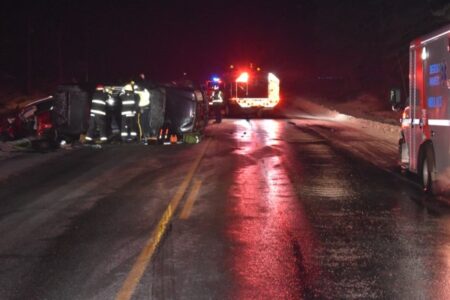River Talk — Truth, Reconciliation and Columbia River Treaty
Eileen Delehanty Pearkes has been researching and writing about the history and politics of water in the upper Columbia Basin since 2005.
Her book on the Columbia River Treaty, A River Captured, was released in 2016. Recently, her travelling exhibit on the Columbia River Treaty, curated for Touchstones Nelson, won a national award from the Canadian Museum Association.
Pearkes has agreed to help readers understand the importance of the Columbia River Treaty to the region with another edition of River Talk.
Today Pearkes writes about a recent court decision handed down in the Nelson Courthouse.
Recently, a B.C. court decision in Nelson confirmed the aboriginal right to hunt of the Sinixt, or, Arrow Lakes Indians, a tribe whose traditional territory stretches from Kettle Falls Washington to Revelstoke, B.C.
The judge’s decision in reference to Mr. Richard DeSautel was based on evidence heard at a three-week October 2016 trial in a Nelson courtroom.
I sat through most of it, and wrote then about my impressions of the B.C. government’s approach to the case (previous River Talk column)
In 2002, I published The Geography of Memory, an account of the Sinixt and their presence in the landscape around the Columbia, Kootenay, Slocan, lower Kootenay, Pend d’Oreille and Salmo Rivers in Canada. At the time, the story of these people was not widely known by local non-aboriginal residents, in large part due to a 1956 bureaucratic “extinction” by the Canadian federal government that effectively eliminated the tribe’s rights. Today, they enjoy wide-spread grass roots support. Their story is an accepted part of museum displays and school curriculums in the region.
Yet, despite growing awareness of the truth, the federal and provincial government position has remained firm: though they may not actually be “extinct,” the Sinixt have no aboriginal rights in Canada. They lost the right, the government says, because they made the choice to leave. For as many decades, the Sinixt have argued the opposite: that rapid settlement, government policy and border enforcement excluded them from exercising their rights. The judge’s decision not only confirmed their rights, it also dealt a blow to the government’s theory that the Sinixt had left voluntarily.
The trial’s outcome will make it increasingly difficult for the Canadian governments to ignore the inherent rights of these people. While the decision is limited to a confirmation of the aboriginal right to hunt, the implications can and should reach much further. A few things about the judge’s reasons stand out to me in this era of Truth and Reconciliation.
First, the judge confirmed in her opening remarks the wide body of historical evidence that supports the historical presence of the Arrow Lakes Indians in the upper Columbia region.
At issue in the trial was not their historical presence, but whether or not they could prove a continued understanding and valuing of of their aboriginal rights. This public confirmation of historic presence is long overdue and makes a strong step in the direction of Truth.
Second, the judge found the Sinixt testifying at trial to be entirely sincere. At issue in law was their understanding of an unbroken aboriginal right to their territory, despite Canada having removed that right with the “extinction.” The judge accepted the testimony of all the Sinixt people she heard as believable.
It was the testimony of non-aboriginal academic experts — one provided by the Crown, one provided by counsel for the Sinixt — that troubled the judge. She found that one expert reversed position under cross-examination, and that the analysis of another did not, effectively, hold water.
For a few decades now, judicial decisions have trended increasingly toward acknowledgement and affirmation of truth rooted in oral tradition and held by the heart, rather than what all the non-aboriginal “experts” are saying. This recent decision from Nelson continues strongly in that same judicial direction and is to be celebrated for its clarity and use of case law to support the outcome.
Enter the possibility of Reconciliation.
The Canadian federal and provincial governments have a spotty history of ethical leadership when it comes to policy related to indigenous people. I find their official position on the Sinixt frankly embarrassing.
Government officials do not acknowledge them in public ceremony, printed literature, web sites and even in private meetings about natural resource use. Land claims discussion and consultations related to the Columbia River Treaty also ignore the tribe.
Many Royal B.C. Museum publications overlook their historical presence. Provincial maps have lumped them as “Okanagan,” identifying them with language, rather than territory in a way that fundamentally offends their aboriginal identity.
The Crown’s next actions during this federal era of Truth and Reconciliation with indigenous people need to be closely watched. While commentators and lawyers surrounding the case expect the decision to be appealed, I wonder, as a taxpayer and resident, about the rationale for such a move.
Do we really want to celebrate the country’s 150th anniversary by once again limiting our responsibility to the indigenous people who have lived along the Columbia River for thousands of years?
What does the government have to gain, and what do the rest of us have to lose?
This all connects to the Columbia River Treaty, the agreement governing use and profitability of the water flowing through the center of Sinixt traditional territory. I can only hope that the next step will not be more expensive and distracting time in the court system.
As the Canadian government negotiates changes to the river that can include a broader set of values, why wouldn’t it do so with all of the identified aboriginal people of the upper Columbia basin at the table?























Comments